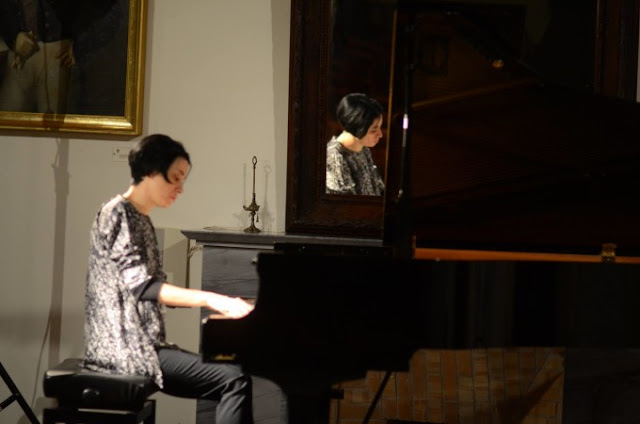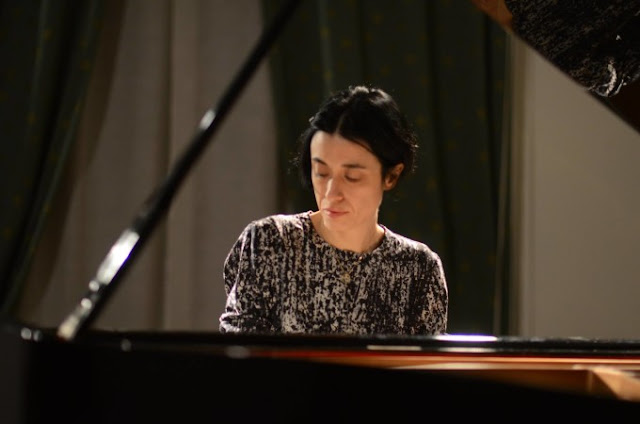 |
| Pina Napolitano |
The Italian pianist, Pina Napolitano will be in London on 24 June 2022 for her recital Tempo e Tempi at Conway Hall. The recital, somewhat postponed, pairs Beethoven piano sonatas with music by Anton Webern and Elliott Carter, whilst Pina's most recent disc on Odradek Records, Brahms the Progressive, vol 2, pairs Brahms with Webern. The pairing of classic 19th century piano repertoire with the music of the Second Viennese School and contemporary composers is something that Pina has been exploring for the last few years, and something she feels passionate about.
She feels that by performing classical repertoire alongside modern, she can highlight the relationship and show the continuity, the things they have in common. Her performances and recordings are currently somewhat mixed up, thanks to the pandemic so the Tempo e Tempi programme with Beethoven and Elliott Carter was originally planned for 2020 the Beethoven centenary, and performing it this year also highlights 10 years since Carter's death. Whilst the Brahms the Progressive programme of Brahms and Webern concertos, with the Lithuanian National Symphony Orchestra, conductor Modestas Pitrenas, was planned for 2021 with the recording coming as volume 2, following her 2018 disc of solo piano works.
 |
| Pina Napolitano performing in Cagliari |
The title of her 24 June recital, Tempo e Tempi, comes from a poem by Eugenio Montale (1896-1981), set to music by Carter in a song cycle of 1998-99 about the way streams of time overlap, and Pina feels that this is very apt for today, as since the pandemic there was been something strange with time, a sense of time being somehow short and extended simultaneously. She hopes that juxtaposition will make the music of Carter more familiar and that of Beethoven more unfamiliar, that we will hear it with new ears. After all, Beethoven's final piano sonatas were shocking for his first listeners, they represented a break with tradition that is akin to the effect of Carter's music now. She is playing music from Carter's Two Thoughts about the Piano which dates from 2005-6, so even this piece is old-ish yet it remains shocking. Just as Beethoven's contemporaries came to accept his late style, she wants to make people unafraid of modern music.
Pina's exploration of the contemporary repertoire came about thanks to the influence of her teacher Bruno Mezzena (1927-2017), he was a piano pupil of Arturo Benedetti Michelangeli and a composition pupil of Alfredo Sangiorgi (1894-1962), who was Schoenberg's only Italian pupil. Mezzena introduced her to the music of the Second Viennese School and she loved it. Her first album was devoted to the music of Schoenberg, and she performed complete programme of music by Second Viennese School from memory, which seemed strange and daring. But she also still loved the 19th-century repertoire and did not want to be pigeonholed, so started placing the two in dialogue.
One of the reasons for her espousal of modern and contemporary music is the feeling that if we do not embrace it, then classical music feels dead. We somehow accept contemporary painting and poetry, but a wall separates the general public from contemporary music. She did not want to limit herself and felt that idea of mixing the styles was good for the public. From the start, her programme drew positive feedback from the public and after her Brahms the Progressive, vol 2 disc many people said that they had not known the Webern concerto, but now loved it.
If she had problems in the early days with her mixture of classical and modern repertoire, it wasn't so much with audiences as with programmers for concert series. There seemed to be a lot of prejudice against the idea, but if she got a concert then the reaction of the public was positive. But she feels that there is also a tradition of a certain type of reception for some music. As a result of the Darmstadt School's intentions to reject tradition, the idea developed of the Second Viennese School rejecting tradition, but she wants to bring out the links to the past, to put the music in an historical perspective. After all, Arnold Schoenberg thought of his music as rooted in tradition.
 |
| Pina Napolitano - Palazzo Siotto, Cagliari |
One of the things she is concerned about is that the 20th-century repertoire is not played in a style that is cold and intellectual. Often music of the Second Viennese School is given in a violent and cold manner, devoid of sentiment and in opposition to romanticism. But Pina feels that music should express something. By the time of the Second Viennese School, the tonal language had become extremely saturated, and something new, a new language, was inevitable. But this new language was intended to be expressive, whilst it needs an intellectual structure. Yet, the music of Beethoven and Brahms has an intellectual structure too, it is just that we are used to it. On the disc, Webern's Concerto, Op. 24 serves as an introduction to Brahms' Piano Concerto No. 2, and she plays both in the same spirit, combining romanticism with intellectual rigour, showing that the two sides can be complementary.
She does not see the music of the Second Viennese School as more or less difficult than the music of Beethoven or Brahms, it is simply different. Also, pianists learn Beethoven, Bach and Brahms from a young age but only come to the Second Viennese School later, it is not part of the normal music education and the music can be difficult to get into at first. But this is changing and there is more music from the Second Viennese School performed at conservatories now; whilst this is 100 years after the music was written, Pina sees this as better late than never.
When she was young she was undecided about whether to be a pianist or a writer, both were important to her and they represent the two sides of her life right now. She has a PhD in Russian literature and writes and translations. She has never abandoned her passion for words, and whenever she feels a need for a break from the piano words provide another intellectual activity. For Pina it is important that playing the piano never becomes mechanical, her playing needs to be nourished and words are important as a counterpart, an important part of her being.
Regarding heroes, she has many. She feels a strong connection to Michelangeli through her teacher Bruno Mezzena. Mezzena was both a wonderful player and a wonderful professor. His way of playing, with its sense of honesty, brought attention to the sound in the service of the music, the composer and the listener. He regarded himself as a go-between, not a showman. And this is more akin to her way of playing, Mezzena taught her a way of being a pianist that avoided what she disliked about showmanship in music. Bruno Mezzena was also a superb teacher, she admired him as a pianist and as a human being.Looking ahead, she has more performances of her Tempo e Tempi and Brahms the Progressive programmes, and she is planning a further Brahms the Progressive volume with a violinist. Another pairing of Elliott Carter's Dialogues for piano and large orchestra with concertos by Bach and Jeffrey Mumford, a pupil of Carter's who has written her a concerto. Another programme that she has in mind is a collaboration with a singer, Brahms's Four Serious Songs, Webern's Drei Lieder nach Gedichten von Hildegard Jone, Op. 25 and music by Kurtag.
She describes herself as curious about everything, so there are other composers she is interested in. The planned Kurtag programme is very much a new world for her, and she would also like to explore Italian contemporary composers. She has a disc planned for the Schoenberg anniversary in 2024, pairing the Kammersymphonie, Op. 9 with the Piano Concerto, Op. 42 in a new arrangement for the same ensemble as the Kammersymphonie. This is a lot of music to learn, she wants to survive this before looking at other new works. She would like to record some Boulez; she had plans for his Sonata No. 2 but these did not come to pass and it is something she would like to return to, another mountain to climb.
Pina Napolitano - Tempo e Tempi: Webern, Carter, Beethoven - Conway Hall, 24 June 2022, further information from Odradek Records
Never miss out on future posts by following us
The blog is free, but I'd be delighted if you were to show your appreciation by buying me a coffee.
Elsewhere on this blog
- Returning the work to its Opera Comique roots: an engaging new Carmen from Opera Holland Park that adjusts tradition rather than reinventing it - opera review
- Emotional atmospheres: a wonderfully lucid production of Tchaikovsky's Eugene Onegin opens Opera Holland Park's 2022 season - opera review
- Real music-making of the highest standards: the Swiss youth orchestra "il mosaico" is caught on tour in Italy by composer Edward Lambert - concert review
- Premiered in Norwich in 1936, the Norfolk & Norwich Festival give a celebratory performance of Vaughan Williams' Five Tudor Portraits - concert review
- A forgotten voice from an earlier era: Mr Onion's Serenade - Mandolin Music of the Edwardian Era - record review
- What a lovely night: an evening inspired by Jenny Lind's charity concerts in Norwich - concert review
- Enjoyment and discovery: Paul McCreesh and Gabrieli Consort & Players in Bach's Ascension Oratorio at Wigmore Hall - concert review
- Adventurous and exciting: So Percussion and Caroline Shaw at the Norfolk & Norwich Festival - concert review
- Time corkscrews inwards: Tom Coult on clocks, time & humanity in Alice Birch & his new opera Violet - interview
- Musical treats: Richard Jones' production of Saint-Saens' Samson et Dalila fails to convince, but there is much to listen to - opera review
- Intensely evocative: Arun Ghosh's spiritual jazz re-imagining of St Francis of Assisi's The Canticle of the Sun premieres in Norwich - concert review
- Striking music, terrific performances: the modern day premiere of Handel's pasticcio Caio Fabbricio based on music by Hasse - opera review
- Rewarding collaboration: Daniel Pioro and Erland Cooper perform live together for the first time at the Norfolk & Norwich Festival - concert review
- Home


.jpg)









No comments:
Post a Comment